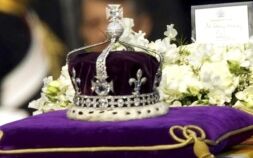正文
India Wants to Recover Crown Jewel from Britain
The Indian government has launched an effort to recover a priceless diamond from Britain.
The Koh-i-Noor diamond was given to Britain’s Queen Victoria as a present in 1850, when India was a British colony. The diamond is now kept as part of the Crown Jewels in the Tower of London.
Ownership of the Koh-i-Noor was the subject of a hearing this week in India’s highest court.
Solicitor General Ranjit Kumar told the Supreme Court Monday that the diamond belonged to Great Britain. “It was given to the British as compensation for help in the Sikh Wars,” he said. “The Koh-i-Noor is not a stolen object.”

His comments shocked many Indians.
In a written statement, India’s Ministry of Culture said the government does not agree with Kumar’s position. The statement said the government would like to bring back the diamond in what it called “an amicable manner.”
Media reports say India, Pakistan, Iran and Afghanistan have each tried to claim ownership of the Koh-i-noor. In recent years, the four nations have demanded its return from Britain.
The mother of Queen Elizabeth II wore the diamond in her crown prior to her death in 2002.
The name Koh-i-Noor means "Mountain of Light" in Persian. Several media sources reported the diamond to be worth as much as $200 million.
I’m Anna Matteo.
VOANews.com reported on this story. Jim Dresbach adapted the report for Learning English. George Grow was the editor.
We want to hear from you. Write to us in the Comments Section or visit our Facebook page.
相关文章
- Brazilian Painter Brings Attention to Threatened Amazon Rainforest
- Former Diplomat Likely to Become Japan’s Next Prime Minister
- Creators of Molecule Building Tool Win Nobel Prize in Chemistry
- Robots Do It All at Japanese Car Factory
- S. Korea Launches Group to Debate ‘Living with COVID-19’
- 'A Piece of Red Calico,' by Frank Stockton
- Past Ability: Could, Was Able To, Managed To
- In Puerto Rico, Creative Directions Make Up for Missing Addresses
- 'Benito Cereno,' by Herman Melville, Part Three
- 'Benito Cereno,' by Herman Melville, Part Two




 手机网站
手机网站